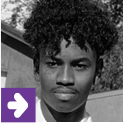
Abdi's Youth Narrative
"They were thankful that they got up and got out and talked to someone in person. It was very helpful for them"
When the 2020 Police and Youth Engagement Program (PYEP) was cancelled in the midst of a global pandemic, the initiative was revamped to provide supports to youth directly through the Youth Navigator program.
Abdi, who participated in PYEP in 2018, is one of ten navigators who were hired to do this work.
“I was supporting youth in the Somali community, which is my community, helping about ten youth aged 15 and 16,” he said. “One of the most common struggles they have is a lack of communication with their parents.”
The challenges of a pandemic intensified some of the struggles that youth in immigrant and ethcnocultural families face on a day-to-day basis.
“The pandemic caused some challenges this year,” said Abdi. “At first it was pretty hard. We couldn’t really link up and talk in person, and some of the youth weren’t as comfortable on the phone as they are now. It was difficult.”
Over time, he was able to build trusting relationships across the barriers that were set up for safety.
“It got better the more we got to know each other. We just started talking, started linking up and getting together in person with social distancing,” he said. “Covid is what made it challenging at first. Then it was awkward when we linked up to have to stay away from each other. A little bit different and weird.”
Challenges aside, helping the youth navigate struggles in their home lives was incredibly rewarding work.
“One of the youth came to me and was talking to me about nd his parents in an African household and he said to me: my mom wants me to cut my hair, can you help me with things to say? He had a big afro,” he said.
“I told him, your hair might be a little bit long, but parents think what you do with your hair is important. So I said, maybe make it a little shorter, or talk to them, tell them you’ll still be the same person with long hair or short hair.”
He talked to his parents and they agreed to just give it a trim.
“They have that communication now,” said Abdi. “It’s just good to talk to each other. All you have to do is talk to your mom and communicate with her.”
Without these supports, a small disagreement about hairstyle, with the added isolation and stress of a pandemic, could turn into a larger family conflict with the potential to damage those essential relationships.
“If they didn’t have this program, with the pandemic they would just be in their rooms not communicating with anybody just on phones or video games,” said Abdi. “They were thankful that they got up and got out and talked to someone in person. It was very helpful for them.”
